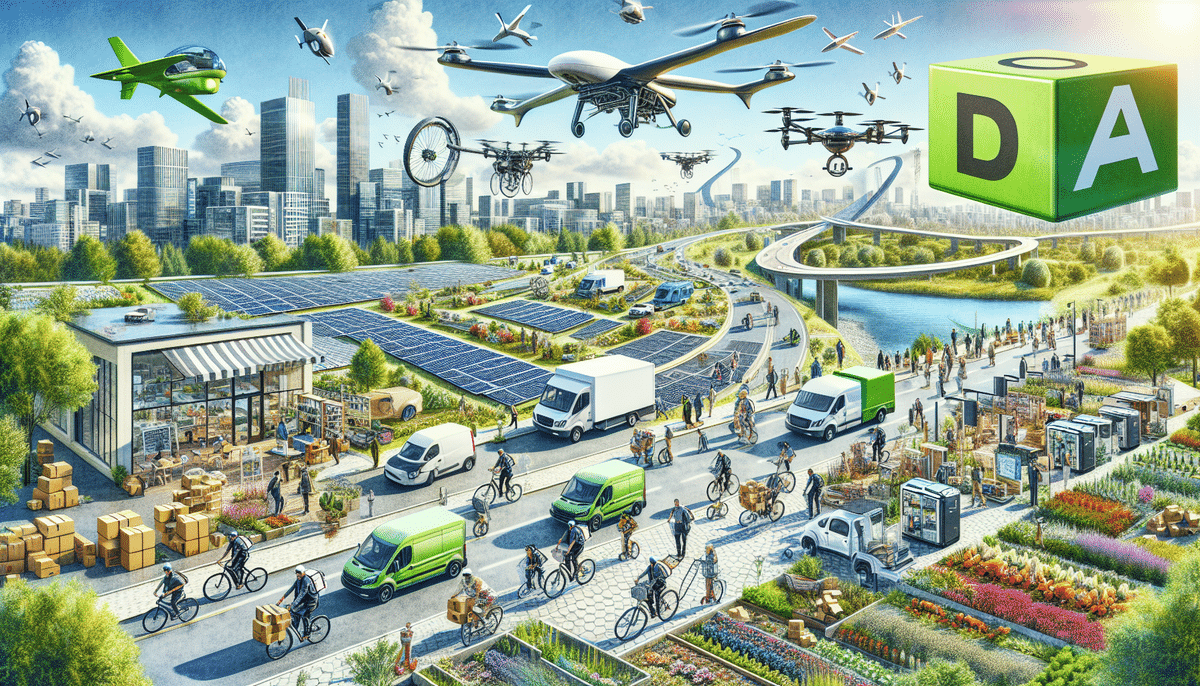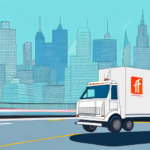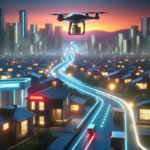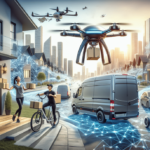Sustainable Advancements in Ecommerce Fulfillment: The Last Mile
Ecommerce has transitioned from being a disruptor to becoming the standard in the retail industry, continuing to grow at a rapid pace. According to Statista, global ecommerce sales are expected to surpass $6 trillion by 2024. However, with the increase in online orders comes the challenge of delivering goods to customers efficiently and sustainably. The last mile, referring to the final stage of the delivery process from the nearest distribution center to the customer's location, is one of the most crucial yet most challenging aspects of ecommerce fulfillment. Sustainable advancements in ecommerce fulfillment aim to reduce carbon emissions, minimize traffic congestion, and enhance the customer experience.
Introduction to Last Mile Delivery and Its Challenges
Last mile delivery, also known as final mile delivery, is the final and often most critical phase of the supply chain. It involves delivering items directly to the customer's doorstep, often within hours of placing an order. However, last mile delivery can be complex due to several challenges, including unpredictable traffic patterns, incorrect addresses, and unexpected delivery requests. These factors can lead to variable delivery times, causing frustration for both customers and ecommerce businesses.
One of the predominant challenges in last mile delivery is failed deliveries. Failed deliveries occur when the delivery driver cannot complete the drop-off, often due to the customer's unavailability or incorrect address information. According to the UPS Freight, the average failed delivery rate can range between 5-10%, resulting in additional costs for ecommerce businesses and decreased customer satisfaction. To address this issue, some ecommerce businesses are adopting innovative solutions such as using lockers or pickup points, allowing customers to collect their packages at their convenience.
The Importance of Sustainable Last Mile Delivery in Ecommerce
As ecommerce continues to grow, it is imperative to address the environmental impact of the delivery process. Sustainable last mile delivery helps to reduce carbon emissions and traffic congestion while enhancing the customer experience. A study by the International Transport Union highlights that urban last mile delivery is responsible for a significant portion of transportation emissions. Sustainable practices not only improve operational efficiency and reduce costs for ecommerce businesses but also contribute to mitigating the adverse effects of climate change.
Implementing sustainable last mile delivery can involve several strategies:
- Electric Vehicles (EVs): Utilizing EVs or bicycles for deliveries can significantly reduce emissions.
- Delivery Consolidation: Combining multiple orders for delivery to a single location minimizes the number of trips required.
- Alternative Delivery Methods: Incorporating bike couriers and drones to reduce environmental impact.
Adopting these sustainable practices can enhance an ecommerce business's reputation, appealing to environmentally conscious consumers.
Green Logistics: Reducing Carbon Footprint and Environmental Impact
Green logistics encompasses strategies aimed at minimizing the carbon footprint of logistics and transportation operations. In the context of last mile delivery, businesses are implementing various eco-friendly approaches such as route optimization, delivery consolidation, and the adoption of electric vehicles.
Additionally, alternative delivery methods like bike couriers and drones are being increasingly utilized to reduce environmental impact. Bike couriers are particularly effective in urban areas with high traffic congestion, allowing for quick and efficient deliveries. Drones, although still in the experimental phase, offer the potential to deliver packages to remote or hard-to-reach areas, minimizing reliance on traditional delivery vehicles and reducing emissions.
Innovative Technologies for Sustainable Last Mile Delivery
Technological advancements play a pivotal role in achieving sustainable last mile delivery in ecommerce. Route optimization tools, which use GPS and advanced algorithms to determine the most efficient delivery routes, can significantly reduce fuel consumption and emissions. Additionally, technologies such as automated delivery robots, self-driving vehicles, and artificial intelligence (AI) enhance both the efficiency and sustainability of the last mile delivery process.
Electric vehicles are at the forefront of sustainable last mile delivery solutions. They not only reduce carbon emissions but also offer lower operating costs and require less maintenance compared to traditional delivery vehicles. According to the U.S. Department of Energy, investing in electric delivery vans and trucks is becoming increasingly viable, contributing to the overall sustainability of delivery operations.
Electric Vehicles and Their Role in Sustainable Last Mile Delivery
Electric vehicles (EVs) are a cornerstone of sustainable last mile delivery in ecommerce. They offer several benefits, including zero emissions, cost efficiency, and reduced fuel expenses. By incorporating electric vehicles into the last mile delivery process, ecommerce businesses can significantly lower their environmental footprint while also realizing cost savings.
Moreover, electric vehicles contribute to cleaner urban air by eliminating tailpipe emissions. This not only benefits the environment but also enhances public health by reducing air pollution. EVs also offer greater flexibility and efficiency in urban settings. With the widespread availability of charging infrastructure, electric delivery vehicles can navigate through congested areas and complete multiple delivery stops without the need for frequent refueling. As advancements in EV technology continue, their adoption in last mile delivery is poised to increase, driving towards a more sustainable and efficient future for ecommerce.
Use of Drones for Efficient and Eco-Friendly Last Mile Deliveries
Drones represent a significant innovation in last mile delivery, offering an efficient and eco-friendly alternative to traditional delivery methods. Drones can be programmed to deliver goods precisely to designated locations, bypassing traffic congestion and reducing delivery times. Although still in the experimental phase, drones hold substantial promise for the future of sustainable last mile delivery.
One major advantage of using drones is their ability to navigate directly to delivery destinations without being impeded by traffic or road closures, making them ideal for urban areas with high traffic density. Additionally, drones can access remote or challenging locations, such as rural communities or disaster-stricken zones, where traditional delivery vehicles may struggle to operate effectively.
Impact of COVID-19 on Ecommerce Fulfillment and the Need for Sustainable Solutions
The COVID-19 pandemic has drastically transformed the ecommerce landscape, leading to a surge in online orders and increased reliance on delivery services. According to Statista, ecommerce sales grew by over 30% during the pandemic, making the last mile delivery process even more critical for business success.
The pandemic has also underscored the importance of sustainability in ecommerce operations. With heightened awareness of environmental issues and a shift towards remote shopping, there is an increased demand for sustainable delivery solutions. Ecommerce businesses must integrate sustainable practices in their fulfillment processes to remain competitive and meet the evolving expectations of environmentally conscious consumers.
Successful Case Studies of Sustainable Last Mile Deliveries by Ecommerce Giants
Leading ecommerce companies have set examples by adopting sustainable last mile delivery solutions. For instance, Amazon has been piloting the use of electric vehicles and drones in its delivery network. In 2020, Amazon announced its "Shipment Zero" initiative, aiming to make 50% of its shipments carbon neutral by 2030. Additionally, Amazon has invested in electric delivery vans through partnerships with companies like Rivian.
Alibaba has launched its Green Logistics program, which focuses on reducing carbon emissions and traffic congestion. The program includes measures such as optimizing delivery routes, increasing the use of electric vehicles, and promoting the adoption of reusable packaging materials.
Other major players like Walmart and Target are also making strides in sustainable last mile delivery. Walmart has been testing autonomous delivery vehicles for grocery deliveries, aiming to reduce operational costs and emissions. Target has partnered with electric vehicle manufacturer Rivian to deploy electric delivery vans, enhancing both sustainability and delivery efficiency.
Future of Sustainable Last Mile Delivery: Trends and Predictions
The future of sustainable last mile delivery is promising, with several emerging trends set to enhance efficiency and eco-friendliness. One notable trend is the rise of micro-fulfillment centers, which are small-scale warehouses located closer to urban customers. This proximity reduces the distance between distribution centers and customers, thereby decreasing the carbon footprint associated with deliveries.
The adoption of electric and autonomous vehicles is expected to grow, further contributing to the sustainability of last mile delivery. These vehicles offer significant reductions in emissions and operational costs while increasing delivery efficiency. Additionally, alternative delivery methods such as drones and robots are gaining traction, offering new ways to minimize emissions and alleviate traffic congestion.
Technological advancements will continue to drive innovation in last mile delivery, with artificial intelligence and machine learning enabling smarter route planning and predictive logistics. Sustainable packaging solutions will also evolve, focusing on reducing waste and enhancing recyclability.
Conclusion: Embracing Sustainability for a Better Future of Ecommerce Fulfillment
Sustainable advancements in ecommerce fulfillment, particularly in the last mile delivery process, are essential for reducing greenhouse gas emissions and alleviating traffic congestion. Moreover, sustainability offers a competitive advantage to ecommerce businesses by enhancing operational efficiency, reducing costs, and improving customer satisfaction. As environmental concerns grow and customer expectations evolve, integrating sustainability into fulfillment processes is imperative for ecommerce businesses to thrive and contribute to a cleaner, greener future.
One effective strategy for embracing sustainability is the use of eco-friendly packaging materials. This includes utilizing biodegradable or recyclable materials, minimizing excess packaging, and adopting packaging designs that are appropriately sized for the products being shipped. These practices help reduce the overall carbon footprint and waste generated by ecommerce operations.
Additionally, implementing sustainable transportation methods, such as electric or hybrid vehicles, can further decrease the environmental impact of delivery operations. By prioritizing sustainability, ecommerce businesses not only fulfill their environmental responsibilities but also cater to the growing segment of environmentally conscious consumers, ensuring long-term success and resilience in a competitive market.






















